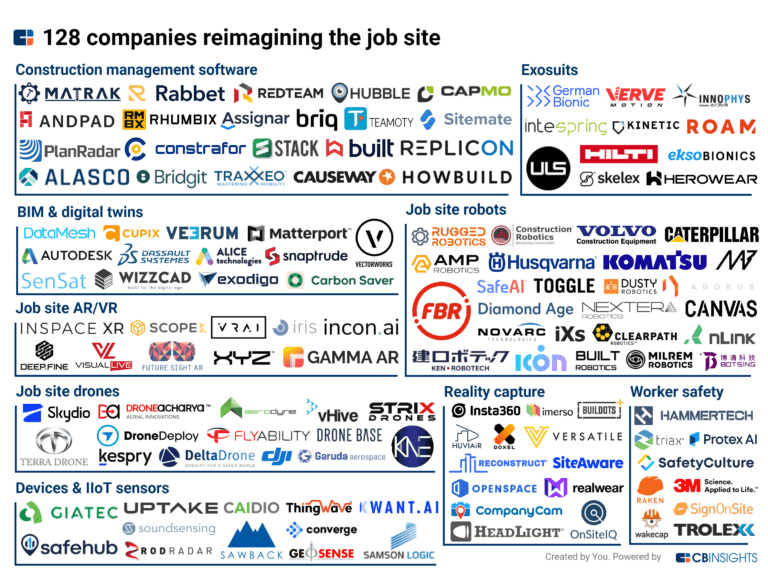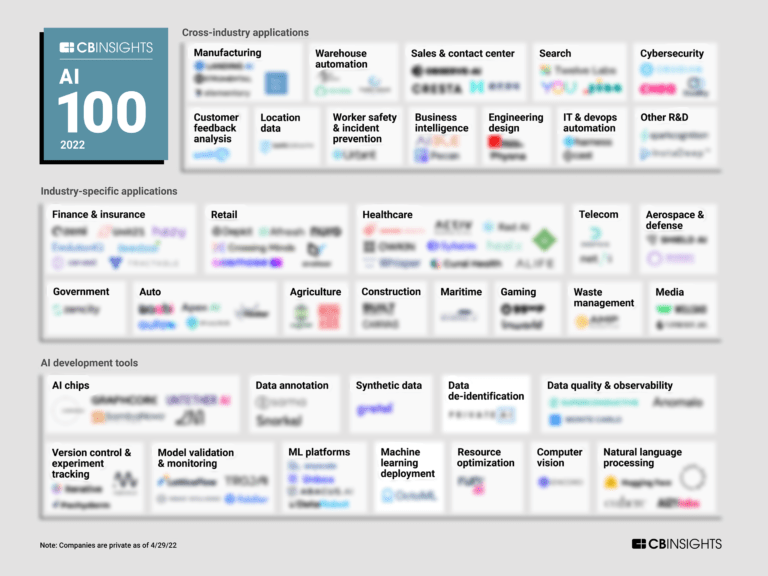
Canvas
Founded Year
2017Stage
Series B | AliveTotal Raised
$25.5MLast Raised
$24M | 4 yrs agoMosaic Score The Mosaic Score is an algorithm that measures the overall financial health and market potential of private companies.
+28 points in the past 30 days
About Canvas
Canvas operates as a construction robotics company using machine learning (ML) to automate drywall installation. Its proprietary system uses a modified JLG lift, robotic arm, and sensors backed by ML to automate drywall installation. The company was formerly known as Pneubotics. The company was founded in 2017 and is based in San Francisco, California.
Loading...
ESPs containing Canvas
The ESP matrix leverages data and analyst insight to identify and rank leading companies in a given technology landscape.
The job site robots market provides robotic solutions designed to work either independently of people or directly alongside them – the latter of which are also called collaborative robots (cobots). These robots can be used for a variety of applications, including excavation, demolition, material handling, and building assembly and are designed to perform tasks with high precision and consistency. …
Canvas named as Outperformer among 15 other companies, including Caterpillar, ABB, and Mitsubishi.
Loading...
Research containing Canvas
Get data-driven expert analysis from the CB Insights Intelligence Unit.
CB Insights Intelligence Analysts have mentioned Canvas in 2 CB Insights research briefs, most recently on Nov 18, 2022.

Nov 18, 2022
128 companies building the future of the job site
May 17, 2022 report
AI 100: The most promising artificial intelligence startups of 2022Expert Collections containing Canvas
Expert Collections are analyst-curated lists that highlight the companies you need to know in the most important technology spaces.
Canvas is included in 5 Expert Collections, including Construction Tech.
Construction Tech
1,404 items
Companies in the construction tech space, including additive manufacturing, construction management software, reality capture, autonomous heavy equipment, prefabricated buildings, and more
Artificial Intelligence
14,767 items
Companies developing artificial intelligence solutions, including cross-industry applications, industry-specific products, and AI infrastructure solutions.
AI 100
100 items
Job Site Tech
864 items
Companies in the job site tech space, including technologies to improve industries such as construction, mining, process engineering, forestry, and fieldwork
AI 100 (2024)
100 items
Canvas Patents
Canvas has filed 14 patents.
The 3 most popular patent topics include:
- robotic manipulators
- passive fire protection
- plastering

Application Date | Grant Date | Title | Related Topics | Status |
|---|---|---|---|---|
4/19/2022 | 2/20/2024 | Thermodynamics, Coatings, Thin film deposition, Semiconductor device fabrication, Fluid mechanics | Grant |
Application Date | 4/19/2022 |
|---|---|
Grant Date | 2/20/2024 |
Title | |
Related Topics | Thermodynamics, Coatings, Thin film deposition, Semiconductor device fabrication, Fluid mechanics |
Status | Grant |
Latest Canvas News
Jul 10, 2024
The Robot Report Listen to this article The electric 1200CX robot for drywall finishing is designed to fit into smaller spaces. Source: Canvas Canvas Construction Inc. today announced the release of its latest product, the 1200CX. The company said that years of development and customer feedback have led to a more compact, lightweight, and maneuverable version of its flagship robot, the 1550 model. This more compact system allows Canvas customers to use its technology in smaller spaces, like multifamily and tower construction projects. The 1200CX measures 30 in. (76.2 cm) by 34.5 in. (87.6 cm), weighs 1,200 lb. (544.3 kg), and has a 12-ft. (3.6-m) finishing height. The company’s previous model measured 15.5 ft. (4.7 m) tall, making it better for taller, more open spaces. “It’s been a huge piece of feedback from our customers, that being able to be compact and get into small spaces allows them to use the robotic system for all of their walls as opposed to just some of them,” Kevin Albert, the co-founder and CEO of Canvas, told The Robot Report . The company equipped the robot with all-wheel steering, making it easier to maneuver in tight spaces. The 1200CX is battery-powered and can run all day on a single charge. It’s capable of wall-to-wall finishing, meaning it finishes right up to adjacent walls and ceilings. Canvas automates drywall finishing Not only does Canvas’ technology enable highly consistent quality across project types; it also reduces the time required to finish a wall from five days in a traditional manual process to just two days, said the company. “One of the core philosophies in the company is that we use the capabilities of the robot to reinvent how the process is done, and not just have a robot that does what people do,” Albert said. “Drywall finishing is the step that comes in between hanging the boards and painting,” he explained. “So, when you’re making an interior wall, you hang the boards on the studs, and then you have basically a panelized wall that looks pretty ugly. You actually have to make that into a flat wall before you prime and paint it. Drywall finishing is that process of using joint compound, or what in the industry is called mud, to flatten out that wall.” “The way humans do it is kind of an iterative process, where you’re applying multiple different thin layers of mud to build up to that flat wall,” Albert said. “For the predominant levels of finishes, it takes about five days to do four steps of mud application and then a sanding step. That means you have to let the wall dry every single day and then come back and do the same area over again.” Instead of manually applying different layers of mud, Canvas’ robots precisely spray all of the joint compounds onto the wall in a single step. This means the company only needs to spend one day applying the mud application and one day sanding. “We use the accuracy of the robot to apply all of the material in one day, as opposed to the four-day iterative process,” Albert said. “And then we have one drying cycle, and it can be sanded back once the material dries.” The robot has an interchangeable sanding head that can be swapped in when needed for the sanding process. It also has a vacuum system that captures 99.9% of dust during sanding, according to Canvas. The company said spending just two days on drywall finishing gives contractors more control over their schedule while making finishing more efficient. Why has the construction industry been slow to adopt robots? According to a 2022 survey from ABB Robotics , only 55% of construction companies across the U.S., Europe, and China said they use robotics, compared with 84% of automotive companies and 79% of manufacturing companies. Despite this, the industry will need to attract an estimated 501,000 additional workers, on top of the normal pace of hiring, in 2024 to meet the demand for labor. So, what’s holding the industry back from automating? “The major problem is that a construction site is an extremely different and much more dynamic environment than a manufacturing floor,” said Albert. “If you think about manufacturing, you’re making standard assemblies that have customized parts, so all the parts are specifically designed for that thing and they all fit together.” “Building is really making a custom assembly out of standardized parts, so it almost turns it on its head,” he continued. “You end up with a very custom, very dynamic environment that you’re only building for the first time.” Albert noted that many robots in the construction industry work on the outside of buildings, making Canvas an even more unique solution in the market. “In construction, you’ve got lots of heavy machinery on the exteriors, you got excavators, you’ve got cranes, you’ve got all of these highly leveraged pieces of machinery that people use,” he said. “On the interiors, it’s all hand tools.” “The thing that’s really interesting about construction is there are 75 independent trades in construction to finish the construction project, and so there is a huge amount of space to bring what I would call advanced or heavy or intelligent heavy equipment into the interiors of spaces,” Albert said. Canvas said its new product can handle a broad range of building types, including multifamily residential, condo, hospitality, hospital, data center, airport, manufacturing, warehouse, education, municipal, and office. The 1200CX can reduce work at height, cut 70% of repetitive motion, and capture 99% of dust, claims Canvas. Source: Canvas What comes next for Canvas? On top of its latest product release, Canvas has been rolling out over-the-air (OTA) updates for its current drywall finishing robot. For example, the company pushed out an update that allowed its robots to finish walls at the customer’s preferred level. Previously, its robots could only do Level 5 finishing, which the the highest level of finishing. This level is typically used in high-end spaces where an ultra-smooth surface is needed. Many Canvas customers, however, expressed an interest in the robots being able to do Level 4 finishing, which is suitable for most commercial spaces. Albert said the company was able to release both the spray and sand capabilities for Level 4 finishing in an OTA update. The company plans to do more updates in the future. “For the first time in the history of construction, the tools we are providing for our workers only get better after the initial purchase,” stated Maria Telleria, co-founder and chief technology officer of Canvas. “We are constantly improving the quality, safety, consistency, and productivity of our products.” “We’ve got some cool software upgrades coming out towards the end of this year, and that will help [the robot] automatically position and handle ceilings,” Albert said. “And then we apply material with a paint sprayer, so adding that painting step and starting to look at other areas that can be done off the platform are pretty exciting.” About The Author Brianna Wessling Brianna Wessling is an Associate Editor, Robotics, WTWH Media. She joined WTWH Media in November 2021, and is a recent graduate from the University of Kansas. She can be reached at bwessling@wtwhmedia.com Tell Us What You Think!
Canvas Frequently Asked Questions (FAQ)
When was Canvas founded?
Canvas was founded in 2017.
Where is Canvas's headquarters?
Canvas's headquarters is located at 1960 Folsom Street, San Francisco.
What is Canvas's latest funding round?
Canvas's latest funding round is Series B.
How much did Canvas raise?
Canvas raised a total of $25.5M.
Who are the investors of Canvas?
Investors of Canvas include Innovation Endeavors, Brick & Mortar Ventures, Obvious Ventures, Menlo Ventures, Alumni Ventures and 8 more.
Who are Canvas's competitors?
Competitors of Canvas include Robosurf and 1 more.
Loading...
Compare Canvas to Competitors
Okibo is a company focused on the development of smart robotics for the construction industry. The company's main offerings include autonomous robots designed to perform tasks such as plastering and wall finishing, operating alongside workers on construction sites. These robots are primarily targeted at the construction industry. It was founded in 2018 and is based in Petah Tikva, Israel.
Transforma Robotics is a company that focuses on robotics and automation solutions within the construction and infrastructure industry. The company offers innovative robotics technology designed to address labor shortages, increase productivity, and improve workplace safety. Its primary customer segments include the construction, manufacturing, workplace safety, public health, and petrochemical sectors. It was founded in 2017 and is based in Singapore, Singapore.
Fangshi Technology specializes in the development of specialized construction robots within the construction technology sector. The company offers a range of robots designed for tasks such as leveling, plastering, painting, and tiling in various construction scenarios. Fangshi Technology's products are primarily utilized in the construction industry for automating and enhancing building processes. It was founded in 2019 and is based in Suzhou, Jiangsu.
Zanecon provides construction services. The company offers construction robotics, manufacturing, and construction technology services. Zanecon was founded in 2018 and is based in Shenzhen, China.
Finish Robotics specializes in developing robotic tools for the construction industry, with a focus on enhancing painting crews' efficiency. The company's flagship offering, Finishbot™, autonomously maps and paints surfaces, working alongside human crews to improve productivity and reduce the need for manual labor. Finish Robotics also provides technician training and certification for operating their robotic systems. It was founded in 2021 and is based in Sewickley, Pennsylvania.

PaintJet focuses on robotics and artificial intelligence in the commercial painting sector. The company offers services such as commercial and industrial painting, specialty coatings, and maintenance and repaint services, all powered by advanced robotics and data analytics. It was founded in 2019 and is based in Hendersonville, Tennessee.
Loading...